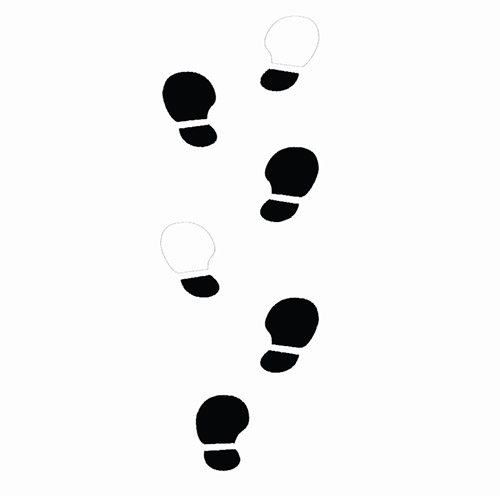
Did you ever find yourself sitting in the kitchen, hearing someone’s footsteps coming down the stairs and saying, “Oh, I hear my wife (or son) coming down the stairs. I can tell by the footsteps”?
This week’s parsha—and this dvar Torah—are all about footsteps we need to be able to recognize. We hear them clearly, but we must train ourselves to recognize and respond to them. What am I talking about?
Our parsha starts with the words “V’haya ekev tish’meun…v’shamar …”—and if you will listen… Hashem will safeguard for you the covenant and the kindness. The Chidushei Harim explains that the word ekev is referring to the period of time before the coming of Moshiach, a time the Gemara calls ikvasa d’Meshicha, the footsteps of Moshiach. What is the connection between the footsteps of Moshiach and our parsha’s sentence besides the word association?
All the commentators are bothered with the unusual word “ekev.” The word usually refers to the heel of the foot (as in the root of the name “Yaakov,” who held his brother’s heel). What does it mean and why is it used here? How is it related to a quality of listening? The simple meaning of the term ekev here means “if you listen,” in the sense of “in exchange for listening.” Rashi explains the word allegorically as referring to mitzvos that we (figuratively) trample under our heel. We perceive them as insignificant, due to our limited perspective, and assign them lesser importance while that might not be the case.
Ramban points out that the word ekev has many different meanings, among them “acharis”—the end. Indeed, the heel is the endpoint of the body. Therefore, he interprets the sentence to be saying that the end result for listening to Hashem is Hashem will guard His covenant.
A thought occurred to me as I stood in shul on Tisha B’Av. On this day of national sadness, we are not allowed to wear leather shoes. Absent leather, our heels are considered to be touching the ground. I thought perhaps that is exactly the point: Tisha B’Av, the day we are most distant from the Beis Hamikdash, is when we most urgently need to get in touch with the ekev, the heel, so that we will be grounded. Tisha B’Av will then be capable of catapulting us to Moshiach. Indeed, Chazal tell us that Tisha B’Av is the birthday of Moshiach!
If we combine all the explanations together, I believe it’s a core life message. We tend to focus on big goals and ideals. Often, we overlook the little things. Areas we perceive as trivial we might neglect or take for granted. But in doing so we are making a mistake. Those small nuances in Jewish law do matter; they ground us. That’s how Rashi explained ekev. If we keep our heels steady on the ground, then we can use our heels to start propelling us forward. That is what we need to focus on at the end of time when we hear the footsteps of Moshiach.
We are in a very difficult era. One hundred years ago, the Chofetz Chaim already said that we are close to the coming of Moshiach. What must we do to shorten the time we must wait for Moshiach? We need to use adverse events occurring in this time to cause us to listen to Hashem, to follow His mitzvos with the appropriate detail and enthusiasm and focus well on our Torah study. We aren’t as perceptive as our ancestors were, so Hashem is sending messages that are less and less subtle! All the political unrest, anti-Semitism and acts of terror are these messages. These events are the footsteps.
We hear the footsteps…but are we willing to recognize the sound and the significance? It’s time we hear with our hearts and minds; really hear! As the word “shema” directs, we must not just listen, but fully understand. By doing that, when we hear the “footsteps” treading near us we can bring Moshiach into the room! Let’s grab onto the heels of Moshiach by being extremely diligent in our mitzvos and by applying that “great principle of Torah,” as Rabbi Akiva (whose name also has the root ekev!) said: “V’ahavta l’rayacha kamocha,” “Love your friend like you love yourself.” If we can listen carefully to each other’s hearts, we will be more finely attuned to the footsteps of Moshiach. May it be Hashem’s will that we hear those footsteps and respond appropriately, so that the sweetest sound our ears hear are the dancing of our own feet with Moshiach in the Holy City of Yerushalayim.
By Rabbi Baruch Bodenheim
Rabbi Baruch Bodenheim is the associate rosh yeshiva of Passaic Torah Institute (PTI)/Yeshiva Ner Boruch. PTI has attracted people from all over northern New Jersey, including Teaneck, Bergenfield, Paramus, Rockaway and Fair Lawn. He initiated and continues to lead a full multi-level gemara learning program in the evenings, gives halacha and hashkafah shiurim on Shabbat and, more recently, has spread out beyond PTI to begin a weekly Beit Medrash program with in-depth chavruta learning in both Livingston and Springfield.













